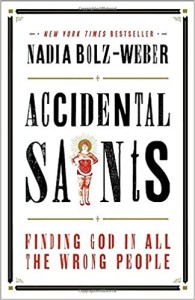From the Junior Warden
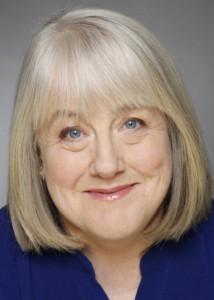 Identity Crisis
Identity Crisis
I’m finding it a bit daunting to write the “cover article” for the Pathfinder this week. I was asked to fill in, and here I am, your Junior Warden. But the crisis at our southern border has me suffering with a minor bout of Imposter Syndrome, a real thing, where I find it difficult to accept praise without self-deprecation, or to take pride in accomplishments because I really didn’t do anything special or heroic or even mildly worthy of acknowledgment, or to write a lead article because I don’t feel like I have anything of substance to offer you. It is NOT a coy way of fishing for compliments. Simply put, I feel really sad and angry about the treatment received by people risking their lives to arrive on our doorstep with nothing, when I have more than a body can rightfully ask for. My daily life is not plagued by authorities questioning my motives or my identity.
Identity. First impressions count, but don’t judge a book by its cover. Who are you? Who am I? Who is that? What’s in a name? Where are you from? What do you do? But the big question being asked today of many, but more often the people at our borders, is “What do you want?” What happened to “Hello, how can I help?” Now since I don’t want to be such a downer, here’s where I shift from dark and brooding to light and fluffy; hence a little of my history:
When I moved to California, I arrived as Ruth Roehmer (the name of a real person, not an attempt at travel humor). I paid $100 (to Ruthie, a trainer at the health club I was managing) for her “free to anywhere” non-transferable one-way plane voucher and fashioned me a Paris Health Club photo ID with my face and her name. Can you imagine a time when boarding a plane with a health club ID was possible? Of course it was a different time, a different century, a different millennium. It was 1988. This was the second time I had impersonated someone in order to board a plane at economical prices because I was a “starving” actor. The first time, I was Mary Yancy, one of four customers who had cancelled their cruise from Tampa to Cancun/Cozumel after their paper plane tickets had been issued. As an exiting employee from Bahama Cruise Lines in New York City, (management decided they needed to hire actual travel-savvy personnel, and let all the actors and playwrights go), my “severance” was a free cruise, and they had me fly to Tampa as Ms. Yancy. Now it wouldn’t be untrue to say I was a little nervous, maybe even a little exhilarated about pulling off such clever deceptions. But let’s face it, my peaches and cream face and my pale eyes were not likely to set off any alarm bells on either occasion. As recently as January of this year, after losing my driver’s license in a pile of snow, I was able to enter the TSA line because I have a United Mileage Plus credit card. Further on at the checkpoint before x-ray and full body screening, this wasn’t enough; fortunately I remembered I had my Costco card which had a barely recognizable photo. So with a full pat-down, an interview, a thorough search of my carryons (the violin fell under extreme scrutiny), they let the teary-eyed white lady on the plane.
Cute anecdotes, right? Insert someone else in those scenarios, someone without standing, without privilege, without the “wholesome” look, you know, someone darker, scarier, foreign, or maybe just someone without a smile on their face because there is little or nothing to smile about. Nothing cute about that, no anecdotes to chuckle at, more likely experiences of diminishment that are kissed up to heaven and hopefully forgotten.
Identity. First impressions count, but don’t judge a book by its cover. Who are you? Who am I? Who is that? What’s in a name? Where are you from? What do you do? But the big question being asked today of many, but more often the people at our borders, is “What do you want?” In this climate, I am praying that I can shake off the most unhelpful feelings of guilt and unworthiness and replace them with a loud voice declaring my opposition to those who need to hear it. If I can step up and convince someone, anyone, that would be an accomplishment I could be proud of.
Respectfully submitted,
Maggie Cooke
Healing Prayers
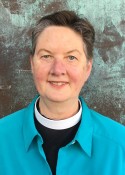 At both the 9:00 am and 11:15 am Sunday Eucharists, we have the opportunity to pray together for special needs. During the time people are receiving communion one or two people make their way to the little table with candles tucked into the area closest to the rear doors on the playground side of the nave. It might be both a lay person and a clergy person who are there to join you in prayer or just one person.
At both the 9:00 am and 11:15 am Sunday Eucharists, we have the opportunity to pray together for special needs. During the time people are receiving communion one or two people make their way to the little table with candles tucked into the area closest to the rear doors on the playground side of the nave. It might be both a lay person and a clergy person who are there to join you in prayer or just one person.
This is a time when you might ask for prayers for a challenge in your life or in the lives of those close to you. A time when the love which Jesus extends to you with your every breath might become a bit more tangible in the prayers spoken with you by another person, in the oil of healing used to annoint you for your healing or the gratitude for a blessing which is too private to share with the entire congregation.
There is a wonderful passage about prayer in former Archbishop of Canterbury Rowan Williams’ book, Being Christian: Baptism, Bible, Eucharist, Prayer, when he reflects on Origen’s teachings about prayer in the fifth century:
“Very near the heart of Christian prayer is getting over the idea that God is somewhere a very, very long way off, so that we have to shout very loudly to be heard. On the contrary, God has decided to be an intimate friend and…has decided to make us part of his family, and we always pray with that basis. With that in mind, Origen reminds us that our prayer is always IN Jesus rather than TO Jesus. Then, as now, people were in the habit of chatting to Jesus as a friend – which is fine in its way; but the essence of prayer as the New Testament presents it is to let Jesus pray in you and take you into the very heart of God the Father…Just as Jesus bears up the suffering and grief of the world to God, so when we pray and join in his activity, we are doing a priestly thing, bringing the pains and needs of earth into the heart of God.” (2014, pages 66-67).
Please take advantage of the opportunity to pray together at the healing station on Sunday mornings!
~ The Rev. Marguerite Judson
From the College of Congregational Development
Feeding Sheep
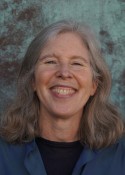 As I write this, I’m still a little foggy-brained from the exhausting pace of a week at The College for Congregational Development. So many people to meet, lay and ordained, from the dioceses of California, Northern California and Montana! So many organization development models to learn, with the help of enthusiastic trainers who do their best to keep our large group sessions lively! So many case studies to facilitate, with a small-group cohort that is often as confused as me but always game for a challenge! So many kind and helpful people trying to make their churches more vibrant, healthy and authentic! It’s a lot to take in; thank God for the idyllic setting, delicious food, and soothing swimming pool. Ahhhh. But I digress.
As I write this, I’m still a little foggy-brained from the exhausting pace of a week at The College for Congregational Development. So many people to meet, lay and ordained, from the dioceses of California, Northern California and Montana! So many organization development models to learn, with the help of enthusiastic trainers who do their best to keep our large group sessions lively! So many case studies to facilitate, with a small-group cohort that is often as confused as me but always game for a challenge! So many kind and helpful people trying to make their churches more vibrant, healthy and authentic! It’s a lot to take in; thank God for the idyllic setting, delicious food, and soothing swimming pool. Ahhhh. But I digress.
About fifty lay and ordained leaders from various Episcopal/Anglican churches gathered at Bishop’s Ranch in June to experience the teachings of The College, which began in the Diocese of Olympia and has spread across the country. In the words of their website, “We gather to learn, connect, and return home with new energy and skills to effectively lead the communities we love” (cdcollege.org). Reverend Marguerite Judson, Emily Hansen Curran and I finished our second weeklong intensive, along with a project at All Souls (Skills You Need workshops) and the reading of many (mostly interesting) books, so we have now completed our requirements. All Souls has sent many members to The College over the years, and even has several trainers in our midst, including the Revs. Brochard and Tichenor as well as Caroline McCall.
But the real purpose of the College, beyond the intensity and excitement of the week away, is to give participants something meaningful and purposeful to share, something that will allow their churches to really shine with the light of Christ. As we teach the models to other leaders or facilitate meetings or tell people about our place of worship, we are developing our organization in an intentional, strategic way that is also Spirit-filled. Thus we framed each day with morning prayer and compline, grounding our work in our communal love for Jesus. We were constantly nudged to wonder: What do you love about your church? How are you sharing that with others? What are you willing to change, if it will improve an aspect of your church? How will you make those changes? The College is “fostering a culture of transparency, courage, flexibility, collaboration and forgiveness in which the congregation and its leaders have a greater sense of choice” (cdcollege.org). If you’ve attended Monthly Ministry, vestry or other committee meetings, you may have experienced the College’s models at work. These tools and skills, which come from the worlds of Organization Development and Congregational Development, are meant to inform and guide the way we do business with each other and the Holy Spirit. By adopting certain practices, we can be kinder and gentler as well as more effective and productive; we can be a stronger, more authentic organization by using our Christian values to inform the way we do church. In other words, using real business practices, undergirded by our faith, we can be better bearers of Jesus’ message and love, living into God’s plans for us with a willing and capable spirit.
Since The College works on a few levels – individual, small group, the whole church as an organization – we were also charged with developing our own self-awareness and capacity for growth while collaborating with other small-group members to achieve specific goals. We used the Meyers Briggs Type Indicator to discuss our possible strengths and challenges; we assessed our cultural styles (for example, preferences for direct or indirect communication) and discussed how this affects our work as individuals and as congregations, since congregations also have Types and cultures. I was greatly encouraged by the vulnerability and perseverance of my fellow CCDers; as the week wore on and the amount of material piled up and our intellectual capacity was stretched, we were fed through our small group interactions. Like Peter, we may assume that everyone – especially Jesus – knows how much we love the Lord, but it is in feeding the sheep that the work gets done and the love is shown. So many sheep to feed! How can we possibly do this work? CCD offers us constructive ways to be better with each other while also getting things done.
– Madeline Feeley
From the Associate for Youth Ministry
Stepping Stones
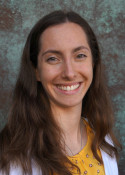 Last summer, Liz and I were planning the arc of youth group for the 2017-2018 program year. We were trying to narrow down the potential themes to something that would be workable for the entire year and applicable to everyone. After lots of brainstorming, we decided on identity. She told me about an All Soulsian, Jim Stickney, who works with stained glass. She suggested talking to him and asking if he would be willing to make stained glass projects with the high school students. I emailed Jim, and we scheduled a time to meet.
Last summer, Liz and I were planning the arc of youth group for the 2017-2018 program year. We were trying to narrow down the potential themes to something that would be workable for the entire year and applicable to everyone. After lots of brainstorming, we decided on identity. She told me about an All Soulsian, Jim Stickney, who works with stained glass. She suggested talking to him and asking if he would be willing to make stained glass projects with the high school students. I emailed Jim, and we scheduled a time to meet.
I went to Jim’s lovely home, which is decorated with beautiful stained glass projects. We walked in his backyard as he explained to me what he had in mind: stained glass stepping-stones that the youth could design, make, and ultimately keep.
He showed me how to cut stained glass and use a putty of sorts to glue it to a brick. I made a smaller version of what the high schoolers would be making. It was harder than it looked! Jim told me that stained glass work couldn’t be rushed. It requires patience. The youth and I learned that over the months that it took to make the stepping-stones. I left Jim’s house that day with a plan and a tentative schedule, balancing his trips out of town with church events and school holidays.
Jim came and worked with the youth and me four times throughout this past school year. He made it a sort of meditative practice. We began sessions with prayer. He was very patient with us as he taught us how to cut glass, how to make designs that would actually work, and how to put those designs together.
The goal for each of us was to pick a design or a symbol that was meaningful to us or represented us in some way. That was easier said than done. Most of us had to change and simplify our designs. Even a simple design requires time, patience, and close attention to detail.
During the first two sessions, Jim introduced the project and taught us how to cut glass. During the last two sessions, we actually cut the pieces for our stepping-stones and put the pieces together. Jim helped us modify our designs when necessary and advised us on colors for the borders and the pieces. I had no idea how many steps went into stained glass projects. I saw how much he enjoys doing them, and I think the youth enjoyed doing them too.
It was slow and peaceful work. Sometimes, I forget how centering it is to build something with my hands, to design and put something together piece by piece. I hope the youth felt that centering sense, too.
Jim finished our stepping-stones for us, which the youth and I are extremely grateful for. We didn’t have time to finish them during youth group. Jim sent me a photo of the almost-completed stepping-stones, which you can find on the All Souls Instagram page. They are even more beautiful in person.
I am so grateful to Jim for making the stepping-stones with us, and I’m grateful to Liz for suggesting it! I’m proud of the youth for taking the time to make these and for their dedication to this long-term project. I hope they got as much out of the experience as I did.
Peace,
Jess
Note: this is Jess’ last article as Associate for Youth Ministry. All good wishes, Jess!
Summer Sunday School
Wondering through the Parables
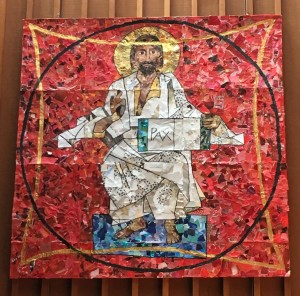
I wonder what is a seed bomb? I wonder what would happen if I tossed this seed bomb into this bare patch of dirt? I wonder what would happen to All Souls campus if we planted native wildflowers here? I wonder what would happen if we planted seeds around the whole block?
I wonder what makes bread so puffy and full of air? I wonder why the dough grows so big? I wonder who makes the bread for communion? I wonder what that bread really is? I wonder what would happen if we really feasted on that bread?
I wonder how you build a table? I wonder how you build a chair? I wonder how you build a whole house? I wonder what would cause me to trade in all of these things I’ve worked hard to create?
I wonder what hare-brained scheme they’ve cooked up for me this Sunday??
If you are a child somewhere between preschool and 5th grade, and you wonder things likes this, summer Sunday school is for you! (And, if you are a teenager or adult who would like to join in making this happen, please talk to Lenore, lenorefw@gmail.com!) We will be wondering about parables and more, in all sorts of creative and hands-on ways this summer. Join us at 10:10 in the Common Room!
Big Sur Camping Trip
July 20-22
Every summer we have an all-parish camping trip at the Santa Lucia campground in Big Sur, right on the river. The weekend includes swimming, singing and s’mores—as well as a group dinner and informal Sunday morning Eucharist at the outside chapel at the campground. You can find more info here and sign up here!
Walk With Us
SUMMER BOOK GROUP
The Summer Book Group schedule continues with:
- July 1 — Chapters 6-8
- July 8 — Chapters 9-11
- July 15 — Chapters: 12-14
- July 29 — Chapters 15-16
- August 5 — Chapters 17-19




